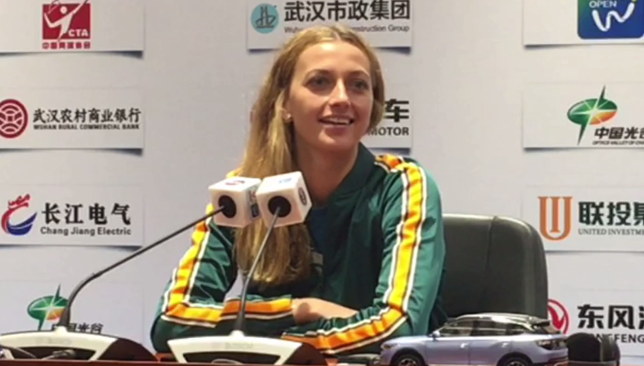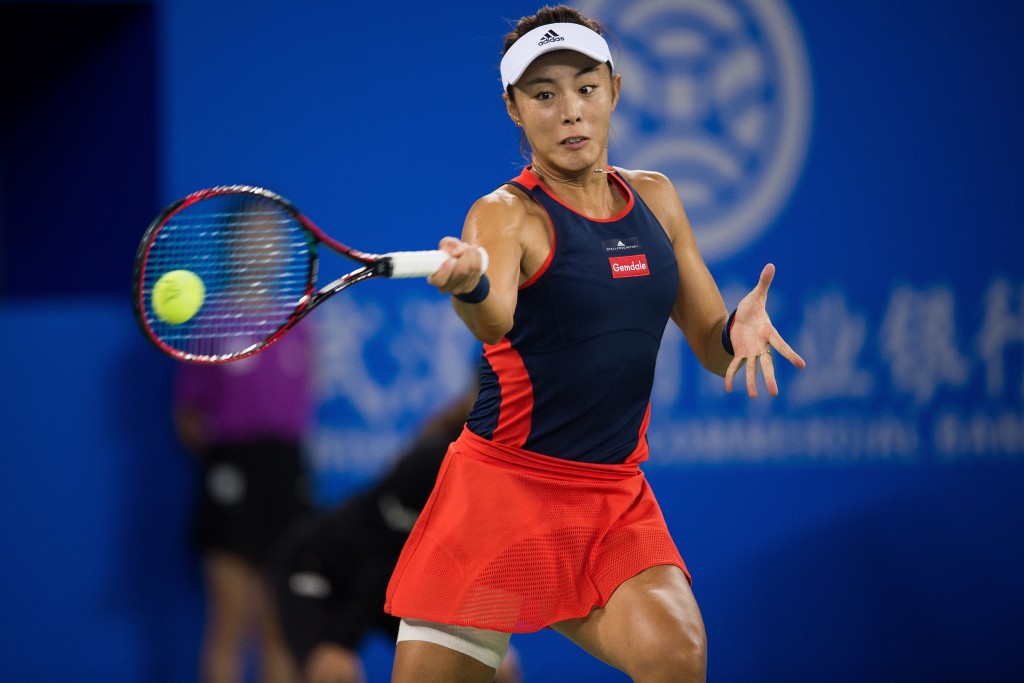She may not be the most talked-about player out there but Wang Qiang is having one of the most impressive stretches of tennis these past few months.
The 26-year-old became the first-ever Chinese player to reach the quarter-finals of the Wuhan Open when she defeated Australia’s Daria Gavrilova 7-5, 6-2 on Wednesday.
It’s the latest in a series of firsts for Wang.
In May, she claimed the first top-10 victory of her career at Roland Garros by beating Venus Williams en route to a maiden third round appearance at a Grand Slam. She then lifted her first WTA title in Nanchang in July before making history at the Asian Games in Indonesia, becoming the first player to win multiple gold medals in tennis singles in the history of the competition.
A gold medal at the Asian Games means a huge deal for Chinese athletes and Wang admits that triumph freed her up even more moving forward.

Petra Kvitova, Daria Kasatkina, Madison Keys joke around with the press – Wuhan diary
“Being in the Asian Games, I felt more pressure because I’m competing for the country. I have to do my best for each point. I’m not representing myself only, I’m representing the government, my country. But here I feel more at ease. I can be more like myself,” she told reporters in Wuhan on Wednesday.

She followed that up by reaching the third round at the US Open, the semis in Hiroshima earlier this month, then picked up her second career WTA title in Guangzhou last week.
These past couple of days in Wuhan, she claimed another top-10 win, this time over world No. 7 Karolina Pliskova, and extended her winning streak to eight consecutive matches on home soil.
While others can shy away from home pressure, Wang thrives on it.
“The bigger the court, the better she plays,” her coach Peter McNamara told Sport360.
“Throw her in the deep end, she likes to be centre stage, she likes the chance to prove herself, and I love that. For me, that’s the ultimate professional, when you want to be out there on centre stage and show your stuff, not be able to fall apart. And she very rarely falls apart at a major tournament or major court.”
Wang, who takes on Puerto Rican Monica Puig in Thursday’s quarter-finals, has looked incredibly comfortable here in Wuhan both on the court and off it. Addressing a jam-packed press conference room after her win over Gavrilova, the Tianjin-native told local press how much she loved competing in front of the home crowd.
“I’m really happy to be competing in China, getting a lot of support from fans. Also I love Chinese food, this is really important to me,” she said.
“When I was very little, I trained in Wuhan. I always felt that coming to Wuhan is like coming back home because I have grown up here. Every year I competed in Wuhan in the ITF circuit or WTA events. I’m really happy in Wuhan, in a Premier 5 event, that I can do so well. I will try to do better to provide a better performance for the audience.”
Wuhan is the hometown of the legendary Li Na, Asia’s first singles Grand Slam champion. Her presence is felt everywhere at the tournament, which came to life on the heels of her second Grand Slam title and just after she announced her retirement from tennis.
She inspired an entire nation to get into tennis and the new wave of Chinese players has already shown early signs of arrival when 17-year-old Wang Xiyu won the US Open junior title this month, then held four match points against world No. 13 Daria Kasatkina in the Wuhan second round on Tuesday.
Wang Qiang believes the future is bright for Chinese tennis.
“She is a goal. She’s a role model for many athletes, especially Chinese players. If I can play as well as she did, I will have a very perfect life,” Wang said of Li Na.
“After the emergence of Li Na, I think we are on the rise. You see young players. At this level of tournament, we see great performances. We have many opportunities to win matches. I think in the near future, in international tournaments, we’ll see more Chinese players.”
McNamara, who has been working with Wang for the past three and a half years, echoes his student’s views on the massive influence of Li Na.
“Everyone aspires to be Li Na, great ambassador to Chinese culture, Chinese values, Chinese everything. And just a great sportswoman,” said the Australian coach, who is a three-time doubles Grand Slam champion himself.
“And as a Chinese player, we can all look up to her and take that strength for what she did. Because what she did was really special, against a lot of odds and I think if you think about the chances they have today, the odds aren’t as difficult as they were back then. I look forward to Q [Wang] stepping up.”
McNamara, 63, has a strong connection with Wang, and says he sees himself as her grandfather. He is baffled by the coaching carousel that is always spinning on the WTA tour and can’t see himself jumping ship to coach another player.
“In a way she’s helped me more than I’ve helped her,” he says.
“Just for me to be a better person. Chinese culture brings out the best in some people, and it’s certainly brought the best out of me with her.
“Her English in the beginning was scarce to say the least, and my Chinese was not good. That’s where I mean, that’s why she’s helped me as a person so much. She’s taught me to communicate in not only a verbal way but in an emotional way. Sometimes words are bluff, but emotion and what comes from the heart is pretty important and we have an unbelievable relationship.
“I’m like a grandfather to her. She can’t get rid of me, and the thing is I wouldn’t go to anyone else. Because you’ve got to like the person. I couldn’t go to somebody else, that’s just not on. For me, it’s her.
“My wife says she comes second, and I said ‘no, darling, my wife is first and Wang Qiang is second’. And that’s the way it is.
“As you can see, we have a great relationship. It works. A lot of coaches go from one to the other, I find it very difficult how you can have a great relationship when you go from one to the other. Doesn’t make sense when last week you coached this one, this week you’re coaching that one, and they’re playing against each other.
“I’d have an emotional breakup, I have to be on Valium or something to get through the match. It just wouldn’t work for me.”
Wang is unsure how she managed to step up the past few months and take her career-high ranking to its current position of 34 in the world.
“I don’t know. Because the beginning of the year I played not so well, just first round, second round, like that, just tell me… I don’t know,” she told me with a laugh.
“I think everything together, but more mental and more believing in myself.”
Wang Qiang since the start of RG:
– 1st Top 10 win (d Venus 1R RG)
– 1st 3R Slam (RG)
– 1st title (Nanchang)
– 2nd 3R Slam (USO)
– Asian Games gold medal
– 2nd title (Guangzhou)
– Best career win (d Pliskova 2R Wuhan)
– 1st Chinese player to make QF at #WuhanOpen
– CH ranking— WTA Insider (@WTA_insider) September 26, 2018
She also credits McNamara for teaching her “how to play tennis, like with the score, at 4-all, 30-all, how to play the point”.
McNamara says it all comes down to professionalism, something he feels Wang lacked in the past.
“I think the most important thing is that she’s changed from being a little bit unprofessional to professional. She couldn’t see it before, it was a bit of a hobby I think playing tennis. But now she realises this is a job, I’m not bad at this,” he explains.
“Last year after Wimbledon she went AWOL and didn’t play until National Games and US Open, so she played one tournament in three months. So it’s a little bit unprofessional.
“But also, it’s when you get on the practice court. She gives 100 per cent, it’s pretty easy, you don’t go out there and just muck around, because then you don’t get anything out of it.
“And in the gym, everything she’s doing is far more concentrated and far more professional. It’s a package to be professional, it starts with the morning and finishes with the evening, and in between you have to get it right. Girls like [Simona] Halep, [Caroline] Wozniacki, these girls get it right. They’re consummate professionals and that’s the difference. They’ve got it organised. And she’s starting to get in that mode.”
He added: “You just have to remind her. She needs reminding of what’s important. This is a job, you want to play tennis, this is 24/7, this is a real job. And you only get one shot at it, so you might as well give it the best chance you can, and she’s starting to realise ‘Oh I might as well give it a good bash’. And she’s giving it a good bash.”
Looking ahead, Wang already has her eyes set on higher targets, and doesn’t feel like limiting herself in any way.
“Top-20, top-10? I think the goal has to be a big one so you can [keep going higher],” she said while making beeping sounds and motioning with her hands like an elevator moving up floor by floor.
On Thursday against Puig, she’ll try to keep her ascent going.